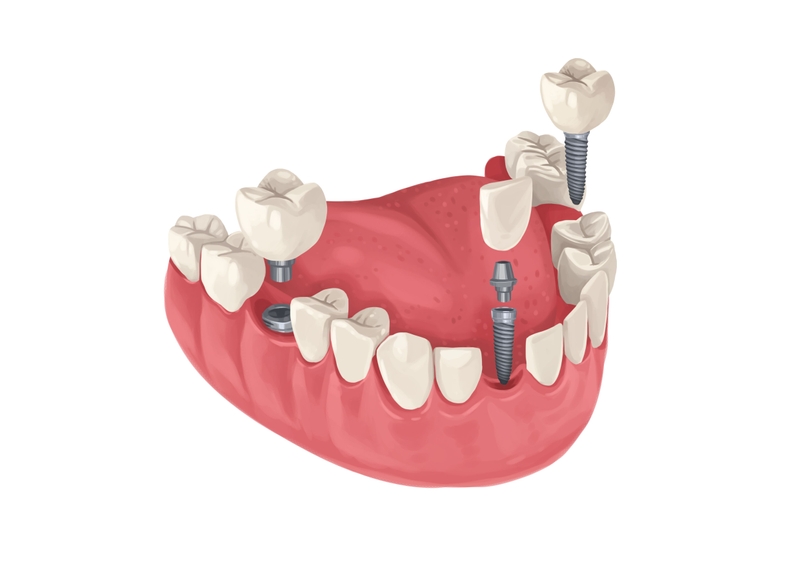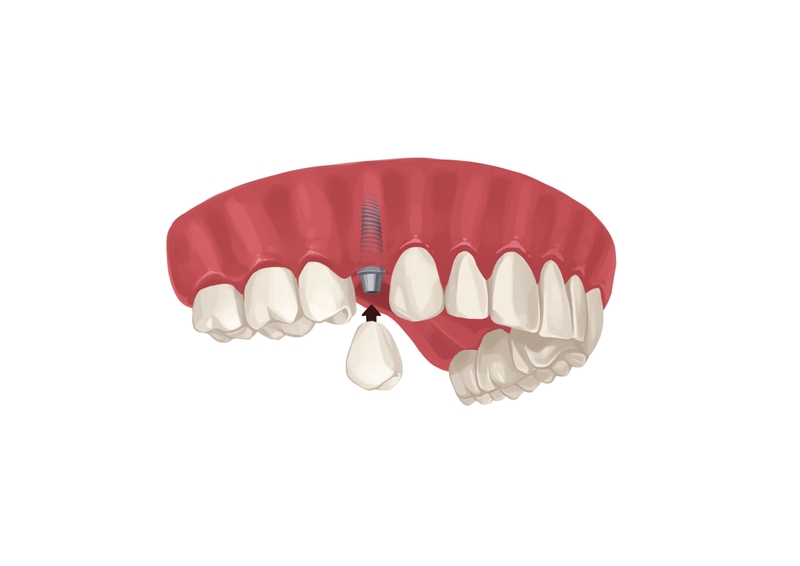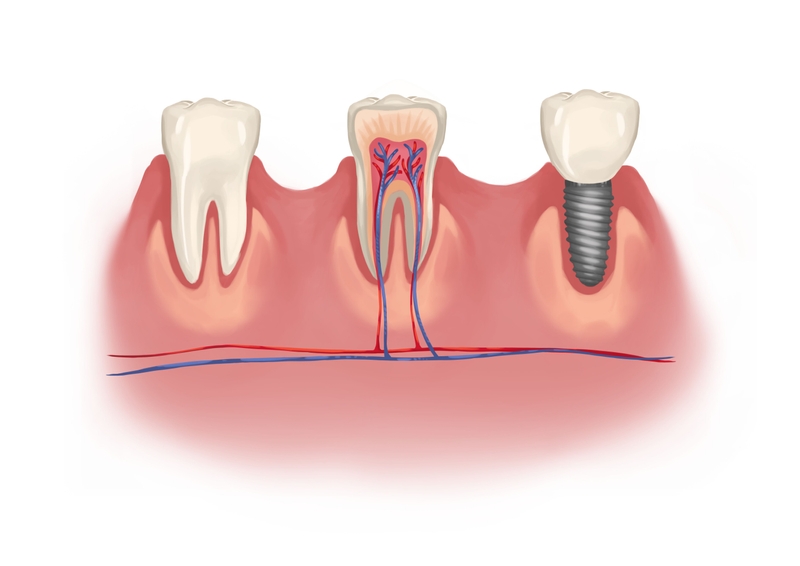- Smoking is the number one risk factor for implant loss. Smoking may be responsible for bone loss and peri-implantitis, leading to implant failure.
- Smokers are more likely to have failure of upper teeth implants than lower teeth implants. Smokers are twice as likely to have their implants fail after a sinus lift.
- Smoking during the implantation process is particularly dangerous, and quitting smoking for two months after the surgery greatly increases the chances of implant survival.
Your best smile starts here. Use Authority Dental to book an appointment for affordable dental implants near you. It's fast, easy and trustworthy.
Do you need to quit smoking if you want dental implants? Here's everything you need to know.
1. Smoking is the number-one risk factor for implant loss when it comes to what patients can control

Picture by Authority Dental under CC 2.0 license
Many aspects related to implant success are at the responsibility of the specialist performing the procedure, the practice, and the quality of materials used. There are also patient-oriented considerations, such as the general health status, as well as the amount and quality of bone.
In terms of what the patient can control the most, there are:
adherence to post-op instructions,
hygiene maintenance, and
smoking habits.
Such an addiction has a huge impact on dental implant survival. Studies showed that smokers have a success rate of 84.2%, while for non-smokers it is 98.6%. Even when tobacco users have a better bone quality, the rate of failure is still higher than in non-smokers.
2. The more cigarettes you smoke per day, the more likely that your implant will fail
Research shows that those who are heavy tobacco users (smoke over 20 cigarettes a day) are more likely to lose their implant. Many different studies confirm this hypothesis.
This leads to the conclusion that light smokers have a higher chance of keeping their implants than those who smoke heavily.

3. Smoking during the implant process is especially dangerous
Ceasing from smoking for a week prior to your surgery allows the short-term effects of nicotine to reverse. This greatly increases the chances of implant survival in levels comparable to non-smokers.
In order to achieve the osteoblastic phase (when the bone cells reproduce most) of healing, you should also refrain from smoking for 2 months after your surgery. By taking care of your implant this way, you allow for osseointegration to begin without the interference of nicotine and tobacco.

4. Smoking can be responsible for bone loss and peri-implantitis which lead to implant failure

Picture by Authority Dental under CC 2.0 license
Smoking can induce bone loss, especially in the upper ridge, which is less dense. When there is less bone, the placed implant (if it can be mounted at all) has a less sturdy base.
Additionally, smoking-induced peri-implantitis puts the implant at an even higher risk. This is because of inflammation and mucosal pockets, which form around the implant. They make the ridge too weak to support a restoration in the long term.
Lee emphasizes: "The damage doesn't stop after the initial healing. Smokers are at a much higher risk for peri-implantitis, an infection that destroys the bone around the implant, leading to failure years down the road. This is particularly true for upper jaw implants, where the bone is naturally less dense."
"For any patient considering an implant, the choice is clear: quit for good, or at a minimum, commit to a strict two-month period of abstinence following surgery to give the implant a fighting chance," he warns.
This type of infection requires emergency dental care, can make your implant loose, and may even need to be removed.

5. Upper-teeth implants in smokers are more likely to fail than lower ones
Smokers were more likely to develop peri-implantitis in maxillary implants, leading to implant failure. This trend is not so visible in mandibular restorations.
Maxillary cavities are closer to the respiratory tract, which makes them more vulnerable to the damaging effects of tobacco. That may be why upper teeth implants fail more often than bottom ones.

6. Implants placed in smokers who underwent sinus lifting fail twice as often as those of non-smokers
When the maxillary ridge is too thin or if the roots of upper teeth poke through into the hollow spaces in the skull called sinuses, augmentation is necessary.
Smokers have a harder time healing from this procedure. This is because the smoke irritates the special cells called cilia that are inside the sinus cavity.

7. Smoking has a negative effect on an implant’s survival after the second-stage surgery
Tobacco use is significantly destructive just before the insertion of a prosthesis takes place. The most damage happens when the tissues immediately around the implant come into contact with smoke.
When the implant site is reopened to attach the abutment, it also allows tobacco to come inside the gums if the patient is a user. This weakens the structural integrity of the soft tissues, making the base for the implant less stable.
8. Smoking increases arginase activity in the saliva, making smokers more susceptible to infection

Picture by Authority Dental under CC 2.0 license
Arginase is an enzyme that is found to be present in the saliva of smokers in higher concentrations than in non-smokers. Scientists argue that it may cause lower nitric oxide production, which makes patients more prone to bacterial infection.
Infections lower the chances of implant survival. If they are left untreated, they can also have catastrophic consequences for your general health.
9. Studies link smoking to a weaker immune system, which makes fighting infection and healing more difficult
It may be surprising, but cigarette smoke can promote autoimmunity (fighting off conditions caused by our own body, e.g., celiac disease). On the other hand, it makes the immune system weaker against outside infections.
Smokers are more vulnerable to infections, which can happen during the implant process. Their immune systems are incapacitated, and it is harder for their bodies to fight them off. That is why symptoms such as implant pain are usually more severe, and failure of implants is increasingly likely.

10. E-cigarettes also affect healing negatively after implant placement
Smoking is not only harmful to the healing process due to the smoke itself, but also due to the nicotine content. The substance works to constrict capillaries, preventing proper blood flow. This can impair recovery and bone growth, both very important processes in implant placement.
E-cigarettes may be less damaging to your lungs, but they still contain nicotine. This means they can prevent proper restoration of soft and hard tissues after surgery.
FAQ
Can you reduce the negative impact of smoking on implants?
Yes, you can. You should say goodbye to cigarettes, at least temporarily. The best solution, however, would be to definitely quit.
Studies show that the negative effects can be reversed. If you stop smoking now, the state of your mouth won’t continue to deteriorate. This can save you the cost of future treatment and restorations as well as improve your general health state.
Find support and quitting tips at SmokeFree.gov.
How long after dental implant surgery can I smoke?
Can I vape after implant surgery?
Vaping can also have negative effects on the healing of soft and hard tissues, just like normal cigarettes. You should try not to consume any nicotine or tobacco products for at least 2 months after the implant surgery.
How do you remove tobacco stains from dental implants?
It may be difficult to remove any kind of stain from a dental implant. While stain-removing toothpastes are recommended for teeth, they are too abrasive for restorations. Your implant could become damaged. The same goes for home methods, such as baking soda.
Your best bet would be to use non-abrasive toothpaste or gel.
References
- Tobacco as a risk factor for survival of dental implants
- The effect of smoking on early implant failure
- Levels of smoking and dental implants failure: A systematic review and meta-analysis
- The effect of cigarette smoking habits on the outcome of dental implant treatment
- Smoking and implant failure--benefits of a smoking cessation protocol
- Smoking and patterns of bone loss in early-onset periodontitis
- Management of peri-implantitis
- The relationship of smoking on peri-implant tissue: a retrospective study
- Microbiology of acute and chronic maxillary sinusitis in smokers and nonsmokers
- Effects of smoking on implant success in grafted maxillary sinuses
- The influence of smoking on 3-year clinical success of osseointegrated dental implants
- Smoking increases salivary arginase activity in patients with dental implants
- Cigarette Smoke and E-Cigarette Vapor Dysregulate Osteoblast Interaction With Titanium Dental Implant Surface
- Impacts of cigarette smoking on immune responsiveness: Up and down or upside down?
- Smokefree.gov by the National Cancer Institute
Peter March, DDS
Any reduction in smoking will be beneficial to the health of the tissues in the mouth and the overall health. Abstinence before and after implant surgery is critical for the implant success.